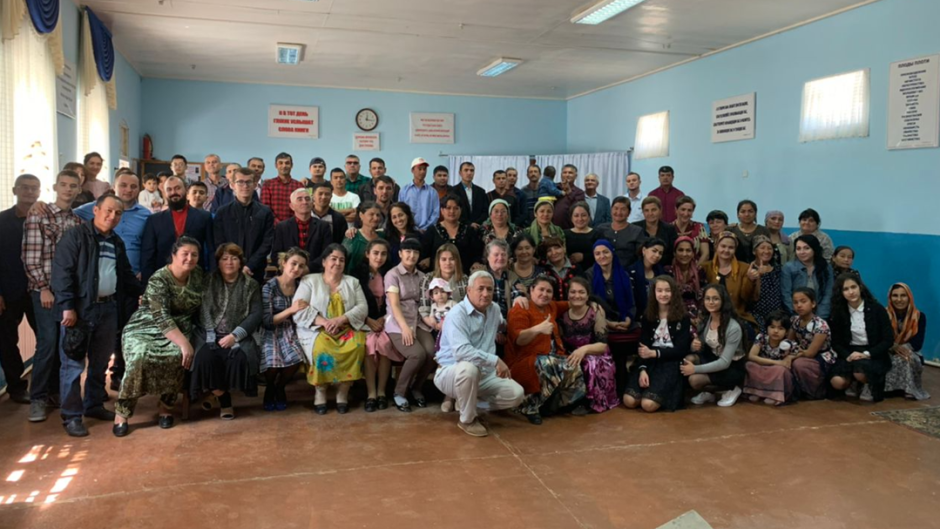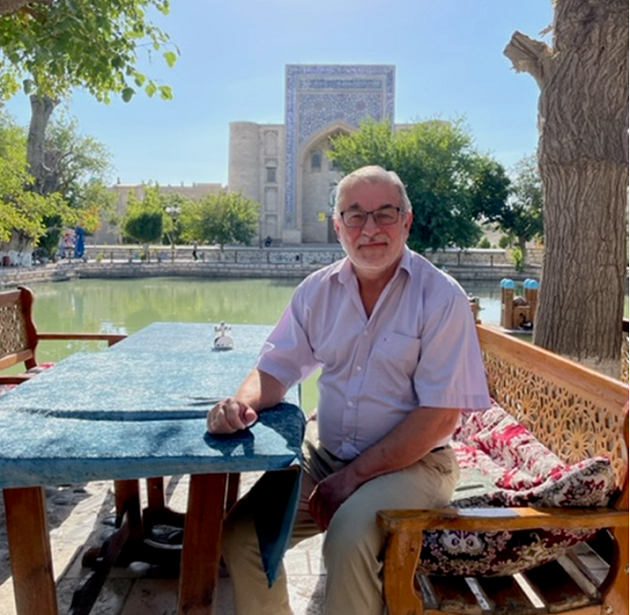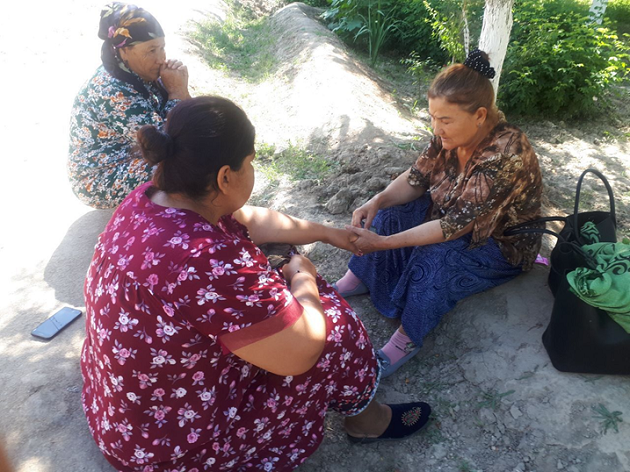Here, I found young, devoted, well-educated and vital Christian leaders, seeking to contextualize the gospel in their native culture.
 A group of deaf Christians in Bukhara. / All photos via J. Reimer
A group of deaf Christians in Bukhara. / All photos via J. Reimer
Bukhara, one of the oldest cities in the world, was first mentioned in 500 B.C. Located on the famous Silk Road, it became a center for trade, culture, science and religion and the home of famous ancient scientists, including Bukhari (810–870) and Avicenna (Abu Ali ibn Sina) (980–1037), a Persian physician and philosopher.
Ancient authors called Bukhara “a city full of knowledge.” UNESCO listed the historic center of the city as a World Heritage site in 1993. Today, Bukhara is the capital city of a region in Uzbekistan, a Central Asian state bordering Afghanistan and Iran. Surrounded by the desert, the region and the city offer a welcoming oasis for guests from the whole world [1].
In ancient times, Bukhara was a Buddhist country. Even the name Bukhara derives its meaning from a Buddhist monastery. Christianity was introduced to Bukhara in the 7th century by the Nestorians. The many coins with Christian symbols suggest that Christianity might have been a dominant religion in Bukhara during the 7th and 8th centuries. Some scholars argue that Bukhara was even the residence of a Nestorian bishop [2]. Bukhara’s people gradually converted to Islam in the late 9th century, and the city went through numerous up-and-down phases in its subsequent history. But Christianity was prominent until the 14th century, when a more radical Islam followed the previous, tolerant Mongolian rulers and forced the Christians out of the country.

[photo_footer] Johannes Reimer in the historic center of Bukhara. [/photo_footer] Christianity came back to Bukhara in the 20th century. Under Russian and Soviet rule, introduced to Bukhara in 1920, Russian, German, Korean, Armenian and Polish Christians settled in the area, often by force. Orthodox, Roman Catholic, Armenian Apostolic, Lutheran, Mennonite, Baptist and Pentecostal churches established branches in the country and also in Bukhara. Those were literally churches for foreigners. Conversions of the native Uzbeks or Tadzhiks were not known. Only after the Soviet state opened up to greater religious freedom under the leadership of Mikhail Gorbachev in 1985 did members of local ethnic groups come to know Jesus and join the church.
In 1991, Uzbekistan became an independent state. Christians, especially ethnic Christians, experienced heavy state persecution under the country’s president, Islam Karimov (1938–2016). Many Russian and almost all German-speaking Christians left the country. Since Karimov’s death and the change of power to the current president, Shavkat Mirziyoyev, the relationship between the government and the churches has improved. Many churches, including Evangelicals, have received official registration, and more and more converts from Islam have come into the churches.
Today the Evangelicals are experiencing extraordinary growth in Uzbekistan, including Bukhara, where five Evangelical churches attract hundreds of mostly Uzbek and Tadzhik believers for worship each Sunday. A number of other churches exist in the province. They worship the Lord in three languages, share their faith in Jesus and actively spread the gospel in the region. As happens everywhere in the world where there is an Islamic majority, Christians in Bukhara bear witness to their faith first and foremost by their changed lives and deeds. Words follow the attractiveness of their lives and service.
“We went from an ingrown, self-centered Pentecostal church to a congregation serving our community,” says one of the Pastors. His growing congregation counts hundreds of people worshiping the Lord throughout the region. At first, the church members were mainly Russians, Armenians, Ukrainians and other traditionally Christian people groups. Today the vast majority are native Tadzhiks and Uzbeks. Among them are many deaf people. “Today you will barely find one village in our region without a house church for the deaf,” the pastor says. “People consider the deaf, blind and other people with inborn disabilities as cursed; we instead serve them, teach them to write and to read, teach sign language to them and offer them an integral part in our Sunday worship service. One of our pastors serves them. His team of evangelists and church planters visit the places, feed them and care for them socially, conduct Bible studies and evangelize them. Hundreds of them have been baptized so far. And through our intensive care for those outcasts, their families have started to open up,” the Pastor adds.
[destacate]“Clean water is good news to the people, and when it is brought by us Christians, we become good news to them”[/destacate]Indeed, during my recent visit to Bukhara, I saw a large group of deaf people gathered in one corner of the hall. Their friendly faces spoke of inner peace and happiness. Finally, it seems, they had arrived at a place where they were fully recognized as humans.Visiting the people in their home areas can turn out to be a very difficult venture. Roads are bad, buses are rare, and many places can be reached only by walking or biking. “We pray for small bikes for every evangelist going to those remote places. A bike is ideal for reaching the unreached, but also for earning a bit of money for self-support,” one of the evangelists tells me. “But the funds needed for such a bike are not available. We are forced to walk or drive a donkey. It takes hours and is, especially in summer, very difficult due to the very hot weather.”
I could understand why the young man was saying this. While we were talking, the temperature was rising to about 50 degrees Celsius. “At the place I come from,” my interviewee says, “today it is 55. It was very difficult to come here, but I am so glad I came.” And the evangelist did not come alone. A number of his deaf disciples came with him. It was obvious how happy all of them were.
The ministry to the deaf is by no means the only work the Evangelicals in Bukhara do. They seem to use every opportunity to proclaim their love for Jesus. “The very difficult time of coronavirus has helped us too,” says the pastor. “We organized mask production, compiled basic food packages and, most of all, delivered clean water to the people. In our area, water is all people seek.” And then he showed me, not without pride, the water purification plant on the premises of their church center.

[photo_footer] A water purification plant used by Christians in Bukhara. [/photo_footer] The plant produces 500 liters of clean water per hour. The water is then distributed among the people in the neighborhood, sold for a modest profit. The church provides the water as a very welcome service and at a reasonably low price. Where poor people can’t pay, the water is given for free. And everyone is served Christians, Muslims or even atheists.
The Pastor dreams of having such purification plants in every village of the region. The generally available water is bitter and often dangerous to the population. “Clean water is good news to the people, and when it is brought by us Christians, we become good news to them. This gives us a real chance to share the good news of our Lord Jesus with them. The relatively high price of building such a plant keeps us from installing them in every place where our people live and work for Jesus.” Indeed, the needed investment of 5,000 Euros is unbearably high for these churches with limited resources. “If only the global church would help us,” says the pastor with a clear appeal in his eyes. I promised to pray for them.
“Caring for the well-being of people in the community always includes prayer for the sick,” another pastor of the church says. “We intentionally go to the COVID-infected people, comfort them and their families, and lay our hands on them in prayer for healing. Many, very many were instantly healed. This too brought people closer to Jesus. But experiencing God´s divine healing also strengthened our young first- generation believers. Today they know what Jesus can do because they have seen Him doing miracles.”
One extraordinary development in Bukhara is the role of women in evangelizing in the area. In fact, the vast majority of evangelists and small group leaders among the new believers are women. Similar to the deaf people, they are considered in some tribal settings as second-class humans and are excluded from many strata of religious and tribal life. At the same time, many of them have received a high-level education in Soviet times and even after independence. The discrepancy between their societal role and the role provided to them by their religion could not be greater. Searching for meaning in life, many of them find answers in Christianity and turn to Jesus. The fact that their husbands are often far away in foreign lands (mostly in Russia) for years as guest workers puts the bulk of the responsibility to care for the family on them. Christian women, as well as the church itself, offer them support and care.

[photo_footer] Women comfort women in Bukhara. [/photo_footer] “If not for the church, I would have long ago committed suicide,” says Kamila, a mother of three. “My husband is in Moscow. His financial support is minimal and my parents-in-law make my life miserable. In the church, I found all the support I needed. I decided to follow Jesus even after my husband divorced me and my in-laws kicked me out of their house. But with the support of the church, I am managing my life well.”
Kamila's story is replicated in hundreds of lives of Uzbek and Tadzhik women. Finding their way to Jesus releases an enormous energy in their lives. As a result, they are testifying about Jesus to other women in their neighborhood and organizing them in Bible studies or even in small businesses to help them survive economically. “Today women are the backbone of the Evangelical movement in Uzbekistan,” says the Pastor.
Most of those women are relatively young—as are the Uzbek and Tadzhik Christians generally. I was invited to teach at a leadership school in another region of Uzbekistan. The invited leaders were between 18 and 25 years old. All of them were already leading ministries, experienced in evangelism and church planting.
[destacate]Here, I saw young men and women with a vision to reach out to all tribes and people groups in their nation[/destacate]The difference from the old-school church leadership of Soviet times could not be greater. Here, I found young, devoted, well-educated and vital leaders, seeking to contextualize the gospel in their native culture; in earlier times, I had encountered old men who had lived their lives under the suffocating conditions of a rigid, traditional, and legalistic faith system. Here, I saw young men and women with a vision to reach out to all tribes and people groups in their nation, as opposed to old men fixed in Russian cultural traditions and language and lacking any understanding of other cultures. Here were young people with a kingdom mentality, embracing everyone who believes in the gospel and follows Jesus—not dogmatically rigid old men who fight for the right kind of church. The worlds of the young and old seem not to mix. The future of the church is obviously with the young!
It is rewarding to visit Bukhara. The ancient monuments of a rich Sogdiana culture are only found here. The Hebrew cemetery opens a door into the rich world of the Bukharian Jews, who have lived here for centuries and recently moved back to Israel. All these features and much more make the place extraordinary attractive for those with an interest history.
Then there is the people’s remarkable hospitality. And their tasty cuisine will leave an unforgettable impression on everyone who visits a restaurant in the city.
But Bukhara is also an attraction for Evangelical Christians. Listening to the witness of the first-generation Christians, experiencing their worship with singing and dance, and being blessed by their inspiring hospitality will leave visitors with a lasting spiritual impact. And of course, Bukharians will feel honored to welcome their guests and comforted by the fact that people have traveled long distances, to the edge of the great desert of Central Asia, to pray with them and support them. Welcome to Bukhara!
Johannes Reimer, professor of Mission Studies and Interreligious Theology and director of the Department of Public Engagement of the World Evangelical Alliance.
2. Dickens, Mark: "Nestorian Christianity in Central Asia", 2001, 5, https://www.academia.edu/398258/Nestorian_Christianity_In_Central_Asia (2.08.2022); Naymark, Aleksandr. “Christians in pre-Islamic Bukhara: Numismatic Evidence,” in Annual Central Eurasian Studies Conference, 1994-1996. Bloomington, 1996.

Las opiniones vertidas por nuestros colaboradores se realizan a nivel personal, pudiendo coincidir o no con la postura de la dirección de Protestante Digital.
Si quieres comentar o